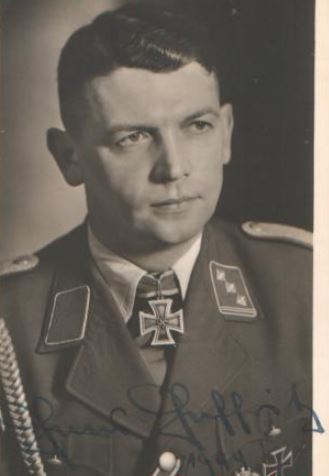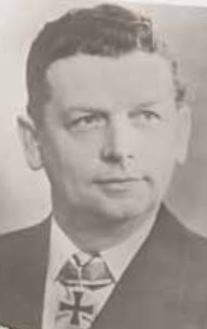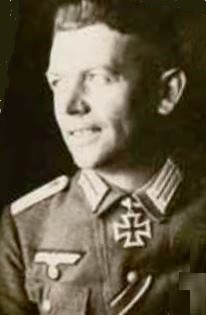Hoffritz, Hans
- Date of birth:
- April 29th, 1914 (Schweinfurt)
- Date of death:
- October 24th, 1974 (Hollerath - Eifel)
- Nationality:
- German
Biography
1941: Feldwebel
1942: Leutnant d.R. / SA Obersturmführer
01.1.1942 – 02.5.1943: Adjutant - Stabschef der SA Viktor Lutze
November 1943: Chef der 14./ Pz. Gren.-Rgt. „Feldherrnhalle"
1944: Hauptmann d.R.
Do you have more information about this person? Inform us!
- Period:
- Second World War (1939-1945)
- Rank:
- Feldwebel (Staff Sergeant)
- Unit:
- Zugführer 14./Infanterie-Regiment 268
- Awarded on:
- September 4th, 1941
“The attack had been in progress for five hours against a bitterly defending enemy defense that was again skillfully established in the terrain. From wheat field to village edge, from there to the next homestead and into the next creek bottom. It is practically the essence of what it means to fight in the endless expanse of Russia.
The Red Army had dug in before us for days, positioning their MGs, mortars and artillery. They had all the advantages of the defense on their side. But it didn’t change anything. There, where they had assumed themselves to be unassailable just two hours before, were German infantry already bringing up their heavy equipment forwards. Everything has to go! We always have the feeling of superiority in both morale and weapons over this insidious and tough opponent.
If only the enemy artillery could be captured! They had mercilessly pounded our ranks for days. If only we could get at them; a thought that ran through everyone’s head at some point. Boom! The thought comes to mind once again. Take cover quickly, again and again. But we cannot contemplate such a matter for too long. Instead we must move forward.
The Pak Zug laboriously works its way forwards. At the head is Feldwebel Hoffritz, who now continues the narrative…
I was personally with the middle gun. From there I had a good overview. I had already acquired the greatest respect for my men in these days and weeks. Brave guys, both in this heat and in the terrain.
Rrummms! That came at us repeatedly from the right. ‘Where did the shot come from precisely?’ was a question I asked have sub-consciously. One gets used to how both friendly and opposing weapons work eventually, and anyone who has this experience would know that that was not a normal shot with a firing and then a few seconds of zipping just before impact.
Then a man from the Infanterie-Zug I was accompanying came up to me. Somewhat breathlessly, he reported:
‘The lead elements are under direct artillery fire. We can’t go on like this. There is also strong machine-gun fire from very close range.’
Blast! Now the real action gets started. I came slowly forwards with my gun, but had to always be under cover. Yet doing so was no longer possible going forwards. I ordered all unnecessary crew members to go into cover, and personally took up the gunner’s post at this small cannon. There, forwards! At the small gap between the bushes. I personally went up in order to scout out the best spot before motioning my comrades forward. Talking was senseless under this hellish noise. The trails were spread out. My eyes are already on the telescopic sight, and the first shell entered the gun. I set my sights on the place where muzzle flashes from the enemy battery had erupted just a few seconds prior. Fire! Stop! Something had already moved again just a little to the left. The next round had already entered the barrel long ago. I only needed to turn the gun just a bit. It took a few minutes. Shell in, aim and away with the things. I observed quite well. Yes, there a few men are jumping to the rear and leaving their gun. And so it repeats. This time with a fast high-explosive round.
But other guns continued to fire from there. The noises from the explosions all seemed to blur together. But thankfully most of them overshot the mark. In their desperation the enemy was firing almost blindly. If only it were not for those damned two MGs between the enemy guns. They gunned for me every time I moved. Then it is calm. Now I can finally change position and get a bit closer. Not much was left of the MGs after I was done with them. I used their tracers to guide in my shells.
Now I can get back to work. I approached to within 200 metres. Then into position for a short time, firing off a few shells before hiding the gun behind the next tree. I had to keep going forward. I can’t fire at the right guns otherwise. The rows of bushes obscure my field of vision, and over there the enemy artillery pieces also fire shell after shell. We drag the gun to the front edge of this row of bushes with no small amount of labour. Now the decisive battle is upon us. I had to go into an open firing position, but in doing so I could also be seen by the enemy. The opposing shells go over our heads with deafening roars. Fortunately for us they did not have any German gunners with German training and German nerves.
The load out of my cannon was fired off a long time ago. My men doggedly brought up one ammunition case after another through this hellish concert. Everything is demanded of us now. Them or us. I am stuck in this hellish firefight. We jump a few metres back before going forward again with high-explosive rounds. Then we only have anti-tank rounds with which to blast the enemy guns. Over on the other side a massive rout erupted.
Then my loader called to me:
‘Only seven shots left!’ Then a pause in the firing. It would not have been the first time that the enemy tried to get a breathing space with a few tanks. And so I continued to observe.
But what is that? Over there are two guns with tractors towing them! They are almost 1000 metres away. Two shots for each one. I hit each one twice.
Meanwhile the Bataillon has sent in an infantry Zug against the battery position at my request. There is only small arms resistance still there. Our men promptly mopped it up.
It is calm at last after 20 minutes, and now I can go over myself. My shells had clearly wreaked havoc. 28 dead Russian artillerymen lay around the area, a few of which were taken out by the infantry Zug. 17 prisoners were taken. 5 guns are now in our hands, including their munitions, vehicles, tractors and anything else that went along with them.
But then what was that over there? Over there were the 6th and 7th guns that had tried to escape before being blasted by my shells. An armoured car that had appeared at the start of the battle was likewise immobile at the position after receiving a direct hit.
The attack continued rolling forwards in a few minutes.
Our thoughts are already on the battle to come. We don’t know how far we’ll have to go today. Maybe to the next hill, maybe further. Probably still further.
The farther the better. Only forwards. I had only one somewhat prideful moment as I stood in this captured Soviet battery position.”
- Period:
- Second World War (1939-1945)
- Rank:
- Feldwebel (Staff Sergeant)
- Unit:
- 14./Inf.Rgt. 268 - 148.ID
- Awarded on:
- August 8th, 1941
- Period:
- Second World War (1939-1945)
- Rank:
- Unteroffizier (Junior Officer)
- Unit:
- 14./Inf.Rgt. 268 - 148.ID
- Awarded on:
- 1940
- Period:
- Second World War (1939-1945)
- Period:
- Second World War (1939-1945)
- Period:
- Second World War (1939-1945)
Sources
- Photo: ✠ Hans Hoffritz (20.04.1914 - 24.10.1971) RK 04.09.1941 Feldwebel Zugführer i. d. 14.(Pz.Jäg)/Inf.Rgt 268 113. Infanterie – Division | Historia, Heroe, Cruz
- HOFFRITZ : AUTOGRAPHEN 1933-1945 HEER (12) : Autographen - André Hüsken Militaria - - 113. Infanterie-Division
- TITLE
- Knights Cross Holder Biographies - Hans Hoffritz
- Scherzer, V., 113. Infanterie-Division: Kiew - Charkow - Stalingrad, Weg und Einsatz einer Infanterie-Division, Scherzers Militär Verlag, Jena, Germany, 2007










